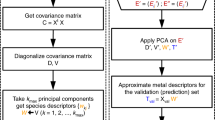Abstract
THE transition from van der Waal's adsorption to activated adsorption is shown by a minimum on the adsorption isobar,1 and a similar minimum occurs on the isobar representing the transition from activated adsorption to chemisorption.2 There is thus a region of temperature over which the amount of adsorption increases with rise in temperature. The experimental work so far published shows that, at least in the case of the first type of transition, the processes are reversible. The positive temperature coefficient must therefore be associated with an increase in the heat of adsorption.
This is a preview of subscription content, access via your institution
Access options
Subscribe to this journal
Receive 51 print issues and online access
$199.00 per year
only $3.90 per issue
Buy this article
- Purchase on Springer Link
- Instant access to full article PDF
Prices may be subject to local taxes which are calculated during checkout
Similar content being viewed by others
References
Cf. Benton and White, Jour. Amer. Chem. Soc., 52, 2332; 1930; and Taylor and Williamson, Jour. Amer. Chem. Soc., 53, 2178; 1931.
Garner and Kingman, NATURE, 126, 352; 1930. Trans. Far. Soc., 27, 322; 1931.
Garner and McKie, Jour. Chem. Soc., 2455; 1927.
Author information
Authors and Affiliations
Rights and permissions
About this article
Cite this article
GARNER, W. Activated Adsorption. Nature 128, 583–584 (1931). https://doi.org/10.1038/128583b0
Issue Date:
DOI: https://doi.org/10.1038/128583b0
Comments
By submitting a comment you agree to abide by our Terms and Community Guidelines. If you find something abusive or that does not comply with our terms or guidelines please flag it as inappropriate.



